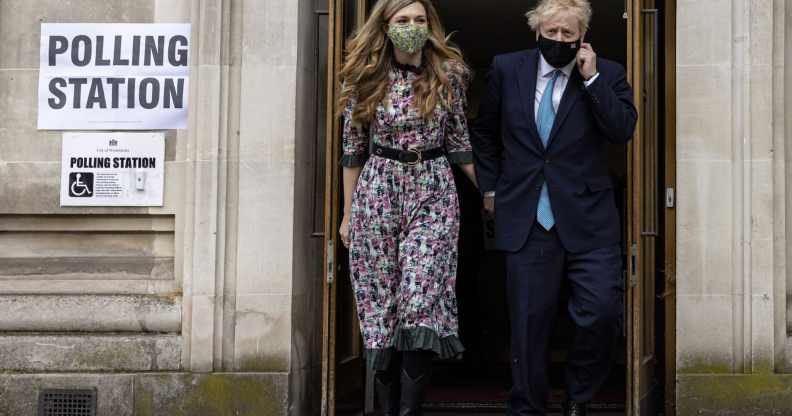Tory plot to make voters show photo ID ‘will disenfranchise trans and non-binary people’

Prime minister Boris Johnson and his fiancée Carrie Symonds leave Methodist Central Hall in Westminster after voting. (Rob Pinney/Getty Images)
Government plans for compulsory photo ID for general elections would severely “disenfranchise trans and non-binary people”, the charity Mermaids has said.
Plans to require voters to produce photographic ID at polling stations is expected to be announced at Tuesday’s Queen’s speech (11 May). Ministers will position the move as an effort to curtail electoral fraud, however statistics show this is a problem that doesn’t really exist, civil liberty groups have stressed.
According to the Guardian, the proposal , first floated in the Tory’s 2019 manifesto, would allow citizens to apply for a voting ID card from their local council.
This however would need to be done weeks before an election and could disenfranchise many, with many suggesting it would disproportionally impact marginalised voters.
Mermaids, a charity for trans youth, warned that the voting reforms would be devastating for trans and non-binary voters especially, coming at a time when non-binary folk are petitioning for legal recognition.
“If this becomes a requirement it will disenfranchise trans and non-binary people who do not have access to representative ID,” Mermaids’ director of legal and policy, Lui Asquith, said in a statement to PinkNews.
“Most of us do not have a birth certificate that reflects our gender identity. Not everyone has a passport. Not everyone has a driver’s licence.
“Those of us who do, may not have the money to update them during our transition. This means that this process will indirectly require many of us to out ourselves in order to vote.
“This is not OK. Everyone should feel confident in exercising their democratic right.”
David Davis, a former Tory cabinet minister, told The Independent that ID checks at polling stations are nothing more than an “illiberal solution in pursuit of a non-existent problem”. He dubbed the proposal “unnecessary” and “pointless”.
Big Brother Watch, a civil liberty group, found that in the 2017 general election just a single conviction of in-person voter fraud took place. That year saw 44.6 million votes cast in what was one of the highest voter turnouts in 20 years,
“We strongly caution against proposals for compulsory photo IDs for voters,” its report, dated 2019, stated.
“Such proposals are unjustified, risk damaging democracy and could lead to an ID scheme by the backdoor.”
In the 2019 general election, some 595 cases of alleged electoral fraud were recorded by the police, the Electoral Commission found. The election watchdog added that only four led to a conviction and a single person slapped with a police caution.
The government has sought to blunt outrage by pointing to the meek successes of recent trials of voter ID schemes in England, some of which saw a “local electoral identity document” tested. The free-of-charge card would be available for those without a passport but must be acquired before the election day.
“Showing ID to vote is a reasonable approach to combat the inexcusable potential for voter fraud in our current system and to strengthen the integrity of our elections,” the prime minister’s official spokesperson told the Press Association.
“Showing ID is something people do when they pick up a parcel at the post office or a library book.
“The 2019 voter ID pilots showed that in elections where photo ID was required, 99.6 per cent of electors were able to cast their votes without a problem.”
But as analysts for Big Brother Watch wrote in its report, of the 2019 voter ID trials, 819 people were refused their vote in local elections across eight trial areas.
“Spending millions of pounds per general election to make voting harder and slower for people who don’t have the right paperwork is the exact opposite of what the government should be doing,” the Electoral Reform Society wrote Monday (10 May).
“We already have low turn out in elections and millions of people lack photo ID. Faced with having to take time off work to attend a local council office and request a special letter to let them vote, people will simply stay at home.”
The move has drawn fierce bipartisan backlash from lawmakers and campaigners who’ve suggested it could block one-quarter of the British electorate from voting.
At least 9.5 million Britons do not have a passport, according to the Office for National Statistics. Around nine million lack a driver’s licence – totalling 24 per cent of voters, the Electoral Reform Society, a voting rights lobbying group, said.

